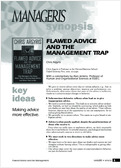Make the best possible use of advisors

How can you capitalize fully on the recommendations of your network of advisors? Their role is not to make decisions for you, but to help you progress in your thinking.
We tend to value advice more when we have to pay for it than when it is free! Likewise, we generally tend to overestimate the value of advice on complex subjects, but underestimate it on simple matters. These conclusions, drawn from a study conducted by Francesca Gina of Harvard Business School, illustrate the many psychological biases connected with consulting.
The fact is that most managers don't know how to make good use of advice. Hardly anyone would dare to question the importance of being able to take advice. But in practice, we often seek advisors who support our thinking and decisions, and not those with a more critical eye. We also tend to consult with others only when we are truly at a loss on a given problem, although by that time, it is often too late to benefit from useful suggestions. We often complain of the poor quality of most of the advice that we receive. So why should we bother to seek advice if we don’t know whether or not it is worth following?
The publications that we have selected point out that the recipients of advice are responsible for ensuring its relevance:
– Put yourself in the right state of mind: it is no use to ask for advice if you aren’t willing to hear divergent opinions or have your views challenged.
– Plan ahead by developing a network of trusted advisors so that you know who you should consult when the time comes.
– Learn to get good advice, have deep and open discussions with your advisors and objectively analyze the quality of the advice you receive!
SubscriberSign in
to download
the synopse (8 p.)
VisitorI want to buy
this synopsis (8 p.)
VisitorI want
to subscribe
See also

Consultants: What’s the point?
How can you develop your ability to secure good advice?


